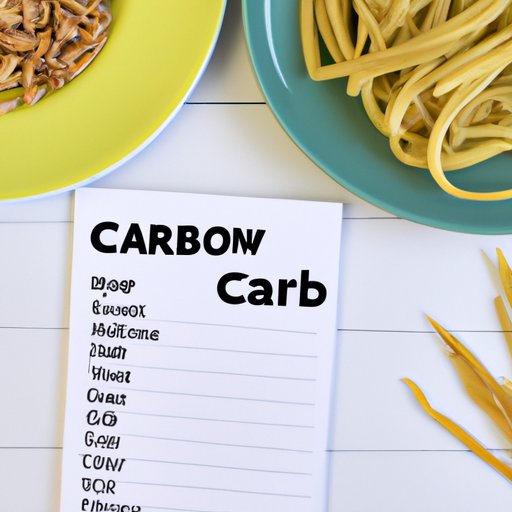
Introduction
Weight loss is a major concern for many people, and there are many approaches to achieving the goal. One of these approaches is carb counting, which involves keeping a track of the amount of carbohydrates you consume daily. This article explores how many carb grams per day one should consume for weight loss, and its intended audience is anyone looking to manage their weight through dietary control.
Explaining the Importance of Carb Counting for Weight Loss
Carb counting involves keeping track of all the carbohydrates a person consumes daily, and it is a crucial aspect of weight loss. By doing so, an individual can track their calorie intake and manage their weight effectively. Carbs are an essential source of energy, and while a low carb intake might prompt the body to burn fat for fuel, it is important to consume a healthy amount to maintain overall health.
Discussing the Different Types of Carbs and Their Impact on Weight Loss
Carbs can be classified into two major categories: simple and complex. Simple carbs are made up of sugar molecules, and they are digested quickly and provide immediate energy. Complex carbs, on the other hand, are rich in fiber and take longer to digest, which results in a slower release of energy.
The consumption of carbs plays a significant role in weight loss, and it is essential to choose healthy options such as whole grains, fruits, beans, and vegetables, as they promote satiety and generally have a lower calorie count. On the other hand, consuming unhealthy carbs such as sugary drinks and refined grains can contribute to weight gain.
Providing a Sample Meal Plan with the Recommended Amount of Carb Grams for Weight Loss
It is crucial to ensure that any weight loss meal plan strikes a balance between all the essential nutrients, including adequate amounts of carbs. According to the USDA dietary guidelines, the recommended daily intake of carbs for adults is 130 grams. However, the amount may vary for individuals based on their activity level, height, weight, and body composition.
Here is a sample meal plan based on a 1500 calories diet:
- Breakfast: A cup of cooked oatmeal with unsweetened almond milk and a medium apple
- Lunch: A green salad with salmon or sliced chicken breast or chickpeas, sunflower seeds, chopped vegetables, and a vinaigrette dressing
- Snack: Greek yogurt with a tablespoon of honey and mixed berries
- Dinner: A serving of grilled chicken or fish, a cup of cooked quinoa, and a side of roasted vegetables
It is essential to observe portion control and ensure that all meals have a balanced proportion of nutrients.
Addressing the Potential Risks of Consuming Too Many Carbohydrates While Trying to Lose Weight
While carbs are an essential aspect of a healthy diet, overconsumption can have adverse effects on weight loss. Consuming too many carbs can lead to a surplus of calories, which can be stored as fat and lead to weight gain. In addition, excessive carb intake can lead to high blood sugar levels, and for diabetics, this can have negative consequences on their health. It is essential to manage carb intake to achieve optimal weight loss and avoid these potential risks.
Offering Tips and Strategies for Reducing Carb Intake While Still Maintaining a Balanced and Fulfilling Diet
Reducing carb intake can be quite challenging, but some strategies can make it manageable. One such strategy is to lower the intake of simple carbs such as sugar and refined grains while choosing healthier options such as vegetables and whole grains.
Another strategy is to include healthy fats and proteins in the diet as they promote satiety and reduce cravings. Finally, it is essential to develop healthy eating habits and adopt a balanced and fulfilling diet that is sustainable in the long run.
Conclusion
Carb counting is an essential aspect of weight loss, and it is a technique that can lead to effective management of caloric intake and promote overall health. The ability to balance the intake of complex and simple carbs by choosing healthy options and developing healthy eating habits is crucial to successful weight loss. It is crucial to combine this with regular physical exercise and a healthy lifestyle and consult with a healthcare provider for personalized advice.




